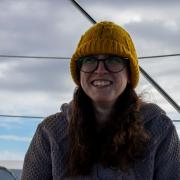Ceren B. Dag
Ceren develops theories to understand quantum matter in and out of equilibrium with analytical and numerical techniques, and search for fundamental principles that govern the many-body systems composed of entangled quantum particles, e.g., atoms, electrons and photons. She earned her PhD in physics at the University of Michigan Ann Arbor in 2021 under the supervision of Luming Duan and Kai Sun working at the intersection between AMO and condensed matter physics. During her PhD, she studied quantum phase transitions, both symmetry-breaking and topological, and quantum many-body dynamics with numerical and analytical techniques. Her PhD dissertation focuses on nonequilibrium signatures of quantum order, and how quantum systems thermalize and scramble information from the perspective of quantum simulation with cold atoms. She provided insight about the relationship between spontaneous symmetry breaking quantum phase transitions and information scrambling (Phys. Rev. Lett. 123, 140602 (2019)), and how topological order associated with Z2 symmetry could slow down infinite temperature information scrambling (Phys. Rev. B 101, 104415 (2020)). Prior to her graduate training, she obtained her double BSc degrees in Electronics & Telecommunications Engineering and Physics at Istanbul Technical University in 2015 studying quantum optics and quantum thermodynamics for her BSc dissertations.
As an ITAMP Fellow, she has been working on many-body quantum chaos, thermalization and violations of quantum ergodicity, nonequilibrium detection techniques of quantum phases and transitions in cold atom simulators and superconducting qubit platforms, Floquet and cavity-QED engineering of graphene based materials. She aims to bring the fundamental principles of theoretical physics closer with device physics in the future.
I have recently lectured about "Equilibration, thermalization, chaos and notable violations of quantum ergodicity in quantum many-body systems" at the ITAMP Winter School in February 2024. Click on Lecture 1 and Lecture 2 to access the content.
I have recently given invited talks at the KITP Conference on Exploring Nonequilibrium Long Range Quantum Matter in November 2023 on quantum scars, and a program talk on cavity induced topology in graphene during the KITP program Out-of-equilibrium Dynamics and Quantum Information of Many-body Systems with Long-range Interactions.
I organized an ITAMP workshop in Fall 2023 on Topological Phases and Strong Correlations in Many-body Systems and Light-matter Hybrids. We have brought together a diverse group of physicists across Floquet and cavity-QED engineering in materials and quantum simulators!
New work is out in January 2024!: Quantum many-body scars from unstable periodic orbits
Our work on Quantum Scars and Regular Eigenstates in a Chaotic Spinor Condensate was published in Physical Review Letters!
New work is out in November 2023!: Cavity Induced Topology in Graphene.
Our work on Complete Hilbert-Space Ergodicity in Quantum Dynamics of Generalized Fibonacci Drives was published in Physical Review Letters!
Our work on many-body quantum chaos in stroboscopically-driven cold atoms was published in Nature Communications Physics!
Our set of works on critical slowing down in sudden quench dynamics and detecting quantum phase transitions in the quasistationary regime of Ising chains were published Physical Review B as a Letter and Regular article, respectively.
Our work on Floquet topological systems with flat bands: Edge modes, Berry curvature, and orbital magnetization was published in Physical Review B!
Main PhD works:
The relationship between spontaneously symmetry breaking quantum phase transitions and information scrambling (e.g., how local operators spread in time and space and become nonlocal) is made intuitive based on an analytical framework : Phys. Rev. Lett. 123, 140602 (2019)
Infinite temperature information scrambling is found to be slowed down when there is topological order associated with Z2 symmetry : Phys. Rev. B 101, 104415 (2020)
The route to thermalization in spinor Bose-Einstein condensates is revealed in terms of eigenstate thermalization hypothesis: Phys. Rev. A 97, 023603 (2018)
A minimal cold-atom friendly spin model is proposed to probe out-of-time-order correlators and information scrambling: Phys. Rev. A 99, 052322 (2019)
Short time transient quench dynamics carry the signatures of quantum order: Phys. Rev. B 103, 214402 (2021)


